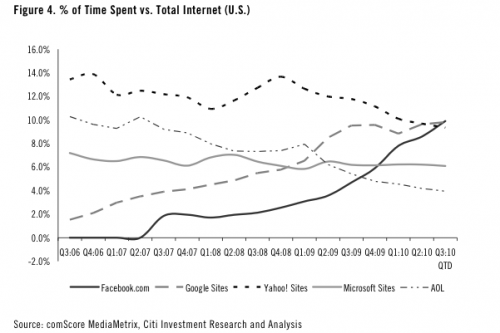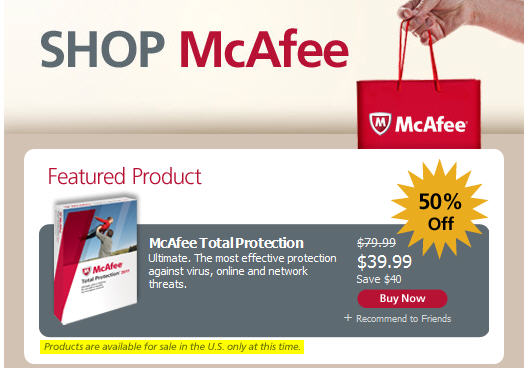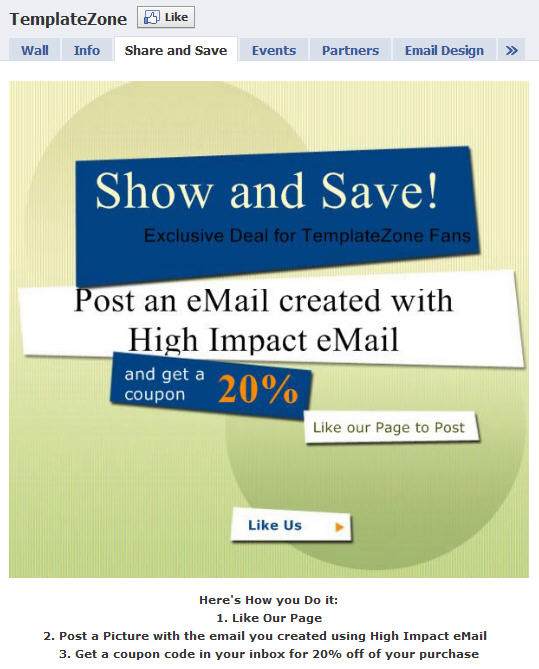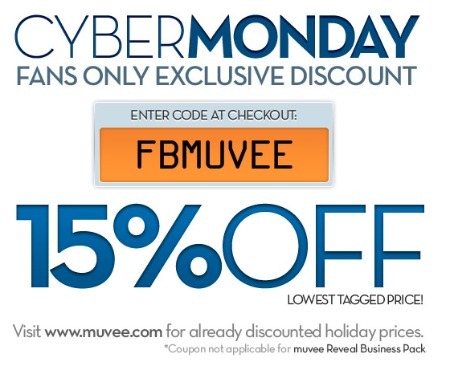2010 was the year that “The Social Network,” a movie about the story of Facebook’s founding, premiered to enthusiastic crowds. Since when has a movie about technology geeks garnered so much attention – even Oscar buzz? Facebook has changed the way people communicate – and now it’s changing the way people do business.
With 600+ million accounts and general acceptance of company pages, Facebook has become an intriguing channel for marketers. 2011 appears to be the year of continuous Facebook growth, including stores within Facebook. There’s no end in sight to Facebook’s popularity and the opportunity presented to businesses selling online. If you haven’t already created a Facebook strategy, now is definitely the time! Without one, you could miss out on serious market share and be easily outdone by your competitors.
This isn’t a “Field of Dreams,” where “if you build it, they will come”. Fans don’t appear out of endless cornfields, and you certainly can’t offer the same corporate marketing spin on Facebook and expect to attract followers. However, there’s never a better time than now to start building your fan base — and it’s not as hard as you think, but you do have to think differently…
Remember how ecommerce took a long time to develop back in the 1990s? Dell was the leader and hit a milestone of $1 million in website sales per day… which was only about one tenth of one percent of their overall revenue. “So what?” people said, “That barely appears on Dell’s balance sheet.” Little did anyone know that Dell’s ecommerce business would soon grow to be one of their largest revenue sources.
The same goes with Facebook. You can’t expect a landslide of revenue immediately, but if you want to be on the leading edge, you can’t ignore the Facebook phenomenon. Simply building or paying for a Facebook store is not a guarantee of success, but it is part of an overall strategy.
Here’s how we recommend you manage your Facebook strategy:
Facebook is an important channel to focus on because:
1. Users spend more time on Facebook than any other site
2. The ability to influence buying habits through use of the social graph, the personal network of friends that each Facebook user has.
The graphic below shows just how quickly Facebook has moved to the number 1 overall position, not at the expense of Google, but rather at the expense of of AOL and Yahoo.

Users who identify strongly with brands, such as Starbucks and Coca-Cola, have not been shy about “liking” their favorite brands on Facebook. Starbucks has 19,000,000 fans and Coca-Cola has nearly 22,000,000. That’s a lot of zeros! If the average friend has 140 friends, this means a potential 100-fold increase in the exposure of a message from either Starbucks or Coke.
With 250 million users logging on on any given day and “liking” corporate entities, Facebook allows Starbucks and Coke to have direct access to self-selected people who are open to communication from them. If Starbucks or Coke were to offer a small promotion or create a new product, they have a willing audience of passionate fans who would drive foot traffic to their store or give feedback on their product.
Clearly, these are international brands that have spent millions (if not billions) on marketing efforts to build a brand over many years. So, how does a company selling digital products with a marketing budget that’s only a fraction of Starbucks or Coca-Cola take advantage of Facebook?
-
Treat Facebook like a new channel –
This may be obvious at first glance, but like the example above with Dell, try to think differently about how to effectively use your Facebook page in conjunction with your other business activities to achieve your goals.
-
Interact directly and candidly with your fans –
So many company Facebook pages are just PR vehicles with sanitized messages. The standard corporate speak doesn’t fly on Facebook — it does nothing to build trust or interactivity with your audience. Boring corporate speak may even cause potential fans to skip “liking” your page. Be real and respectful — your fans will appreciate it. You may want to identify the person who interacts with fans and let them get to know him or her.
-
Build your fan base –
Remember when building your email list was the most valuable way to reach potential customers? For email, many tactics are employed to get the users to opt-in, but with Facebook, a simple click of the “Like” button is enough to create that connection with your customers. There are so many ways to build your fan base, but simply asking people to “Like” your page is the most successful. Be careful to not use misleading tricks to gain fans, the social media universe will rise up against you.
-
Leverage existing customer touch points –
Just like you would a double opt-in email request, put the option to “Like” your company on Facebook everywhere! Where you used to put a registration form for email, try things like “Like us to get access to…”. If you are a software company, put a like button on the trial download page. If you are a SaaS company, give your customers the chance to like you from within the application. For media companies, use any landing page as an opportunity to get more fans.
-
Offer preference to fans who “like” you –
Offer unique content, special incentives or even trivia question to your fans! Whatever it is, be clear about what fans receive so that you don’t have lots of likes and then subsequent unlikes. This is also an opportunity for cross-over integration between Facebook and your other channels: website, email, twitter, etc.
-
Create Facebook-only offers –
If you offer free or trial products or have users that are contemplating your product or service, Facebook-only deals are a great way to monetize those people, who are likely not part of your email list or regular viewers of your website. Use special occasion offers, but be sure to change them up.
-
Create a Facebook store –
Make it easy for your customers, who are feeling more and more comfortable on Facebook, to buy without leaving the Facebook ecosystem. But remember, 70 percent of Facebook users are outside the U.S., so make sure you are providing all of the options international shoppers need to buy. If you limit your Facebook store the U.S. market, you are missing out on a huge pool of potential customers.

Keystone
We are really excited about the changes happening in the sphere of ecommerce! Facebook appears to be one of the most valuable tools to come along, and we strongly recommend that you create or cultivate a Facebook strategy that works for your business.
What else should companies consider when building a Facebook strategy? What are your thoughts about the future of Facebook?



Great write-up on the impact of Facebook and how companies need to change they way they think and do business with consumers.
I really think that humanizing the customer experience is a big boost for small businesses that can now compete in this arena more effectively with the larger corporations.
Again, great blog!
Thanks Lyle. Humanizing the customer experience is probably even more important for large companies since they often fall into the “who’s responsibility is that” category. Smaller businesses often have people making it happen who take charge and show their personality naturally.
I personally love how Camfrog handles this:
http://www.facebook.com/#!/Camfrog
All they do is add one word to make the post “in character”. Check them out.
cheers,
craig.
This is an amazing write up on the importance of a Facebook presence, and is truly an asset to anyone who is trying to gather an understanding of the necessity of a Facebook business page.
I am actually speaking on a similar topic at the Conversion Conference West in March. Look for a reference to some of your work (probably in the form of a blog post or within my presentation)! I really think you have hit the nail on the head with your focus on social media, especially with the introduction of your advanced ecommerce system within Facebook.
Hi Justin,
Thanks for commenting and giving your thoughts. We’re excited to hear about your speech at Conversion Conf West. Good luck and let us know if there’s anything that we can provide for your talk.
cheers,
craig.
Great post!
What I’d like to hear more about is tools and metrics others are using to measure the success of their social strategy. For instance, what steps are being taken to track the profile of your fan base, e.g. the percentage of your fans that own your products or where they came from (facebook coupon promotion, a fan’s recommendation, email campaign, etc…).
100 fans with 10 friends each is 1000 potential exposures, but what is the actual value in terms of bottom line? How many of your posts/tweets are being recommended or retweeted and what is the avg value? I once worked with a social marketing agency whose metric for success was the percentage increase in fans/followers month over month. Needless to say, I wasn’t very happy.
Also, I imagine that it’s not a very difficult decision for companies like Coca Cola and Starbucks to simply reallocate marketing $ from the millions they are spending on traditional, offline marketing activities taht are primarily faith based initiatives. The decision to shift time and/or marketing $ isn’t as simple for those with only a fraction of the budget as the aforementioned brand namees when you take into consideration the cost of apps and services needed for a successful strategy.
I’ve looked into Webtrends, the analytics tools offered by Involver, and I’ve also read about using Google Analytics for pages/apps created in FBML. What other options are there?
Perhaps a good follow-up topic for this is blog is, “How does analytics and business intelligence play into your social strategy?”
-Eugene